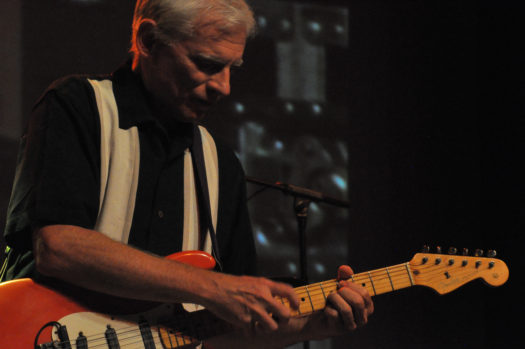Interview with a bad musician, as if guitarist and saxophonist, problematic person Randy Resnick. An interview by email in writing.
JazzBluesNews.com: – First, let’s start out with where you grew up, and what got you interested in music. How exactly did your adventure take off? When did you realize that this was a passion you could make a living out of?
Randy Resnick: – I was born in Minneapolis, Minnesota. When I was about 13, an uncle gave me a beautiful Goa classical guitar. I messed around with it, I started with folk music like Peter, Paul and Mary. Not long after, traded it for an electric and an amp. Eventually, the British explosion of bands had me copying the beatles and the Stones. From the stones, I found the real blues players like BB King, ALbert King, Freddy King, Albert Collins.
JBN: – How has your sound evolved over time? What have you been doing to find and develop your own sound?
RR: – I played in bar bands for a few years. In those days, you could play in the same club 5 or 6 nights a week for a salary! I got the idea I had to go to L.A. to advance in music. There I met a lot of people who influenced me, but my main mentor was drummer Paul Lagos. He turned me on to African and latin music as well as jazz, which was new to me.
JBN: – What routine practices or exercises have you developed to maintain and improve your current musical proficiency, in terms of both rhythm and harmony?
RR: – In my 20’s, I had notebooks full of stuff to practice on guitar. Scales, patterns, etc., thanks to Paul’s influence, it was more “advanced” stuff, like symmetrical scales and a lot of work on rhythm. When I first started alto sax 4 years ago, I learned to play standards to understand where the notes are. For the past 2 years on alto and soprano saxophones, I just play, I make up phrases and turn them into songs.
JBN: – Have you changed through the years? Any charges or overall evolution? And if so why?
RR: – I grew up playing pop, rock and then blues rock and fusion. Only a few years ago, I realized that everything I was writing in the 1990’s was better on saxophone, so I began on alto, then soprano saxophones. The bulk of what I do now is on those with some guitar.
JBN: – How do you prepare for your recordings and performances to help you maintain both spiritual and musical stamina?
RR: – At almost 75, I’d say I have an unusual amount of energy! I try to stay in decent form by eating properly and exercising. Music gives me so much pleasure it must be in my spirit.
There could be talk or advertising about your CD
JBN: – In your opinion, what’s the balance in music between intellect and soul?
RR: – That is a brilliant question. I would say that intellect gives you the ability to hear. Soul allows you to connect to the universe through an instrument, the soul being your humanity.
JBN: – There’s a two-way relationship between audience and artist; are you okay with delivering people the emotion they long for?
RR: – I try to please the audience when playing live.
JBN: – How can we get young people interested in blues when most of standard tunes are half a century old?
RR: – I think music progresses naturally despite the interference of the business. When told that “90% of sci-fi is crap”, the author Theodore Sturgeon said, “90% of everything is crap.” I have a Musicality room on Clubhouse to try to show people how to listen to music regardless of genre. WHile 90% of everything is probably crap, every genre has 10% of brilliant music, I think.
I’m always surprised to meet people in their 20’s that love jazz like Coltrane’s Ballads album. I think whatever music they listen to is fine, as long as they hear it.
JBN: – John Coltrane once said that music was his spirit. How do you perceive the spirit and the meaning of life?
RR: – I believe although I am not destined for greatness, my spirit is in my music.
JBN: – If you could change one single thing in the musical world and that would become reality, what would that be?
RR: – Bring back live music in the small clubs. WHen I was coming up, most clubs had bands.
JBN: – Whom do you find yourself listening to these days?
RR: – Today, I hear the music I focused on the in 1970’s in my head. I can always listen to the blues and jazz greats, but I also try to find interesting tracks of all cultures. I have been listening to Salsa and African Tribal music for 5 decades.
JBN: – What is the message you choose to bring through your music?
RR: – When I sing, it’s mostly comedy.
JBN: – Let’s take a trip with a time machine: where and why would you really want to go?
RR: – To the Village Vanguard to hear Trane play Spiritual. I’ve listened to that live recording a thousand times!
JBN: – At the bottom line, what are your expectations from our interview?
RR: – Any opportunity to be visible is great.
Interview by Simon Sargsyan







More Stories
Interview with Janis Siegel of The Manhattan Transfer: Jazz, being a more refined, interpreted form of music
CD review: George Benson – Dreams Do Come True: When George Benson Meets Robert Farnon – 2024: Video, CD cover
The band was tight as ever. The Warren Haynes Band cuts loose: Video, Photos